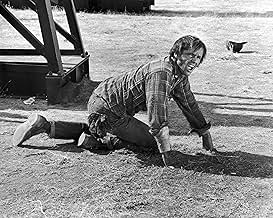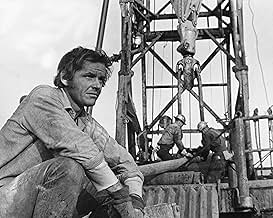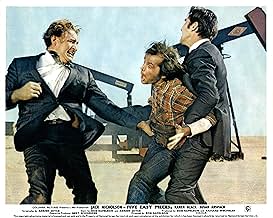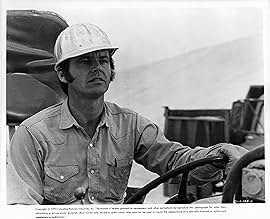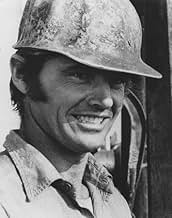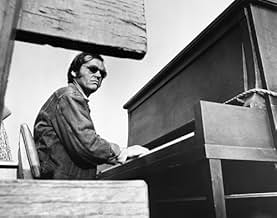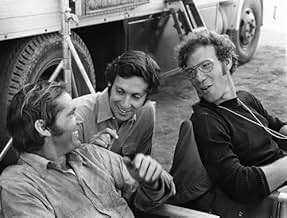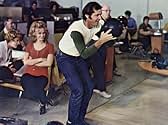Un déchu de la classe supérieure américaine reprend du travail sur les plates-formes pétrolières alors qu'il passe sa vie dans une succession sordide de bars, motels et autres centres d'inté... Tout lireUn déchu de la classe supérieure américaine reprend du travail sur les plates-formes pétrolières alors qu'il passe sa vie dans une succession sordide de bars, motels et autres centres d'intérêt.Un déchu de la classe supérieure américaine reprend du travail sur les plates-formes pétrolières alors qu'il passe sa vie dans une succession sordide de bars, motels et autres centres d'intérêt.
- Réalisation
- Scénario
- Casting principal
- Nommé pour 4 Oscars
- 11 victoires et 23 nominations au total
- Elton
- (as Billy 'Green' Bush)
- Betty
- (as Sally Ann Struthers)
- Twinky
- (as Marlena Macguire)
- Spicer
- (as John Ryan)
- Junkie
- (non crédité)
- Baby
- (non crédité)
Avis à la une
Meanwhile, unfolding alongside the Dupea character, was Karen Black's tour de force performance as the big-haired clingy-dependent waitress girlfriend, Rayette, and doing it to a medley of apropos Tammy Wynette tunes. Karen Black's performance perfectly captured and spot-on nailed an almost ubiquitous sort of woman prevalent in that era, when the social changes wrought by the women's movement had not yet taken fruit.
As for the notorious diner scene, this one scene essentially dominates the whole movie. It is something that people who have seen the movie will bring up and talk about, even decades later. Yet the scene is in no way pivotal or important to the story. At most it once and for all permanently affixes in the viewers' minds that Dupea was an impulsively flippant and angry person, not one to meekly abide any of life's minor frustrations. But we were already getting that picture of him before this scene happens. And, courtesy of Dupea, the scene provides a snippet of gratuitous social commentary about inflexibility and the stupidity of mindless adherence to meaningless rules. Something for the viewers to cheer and say, "I can relate to that!" Those things aside, to me the real value of the scene was that it provided an entertaining contrast in a bleak drama, a needed change of pace. But regardless of whether it was a statement about Dupea's attitude, or a social comment about stupid rules, or a needed amusing interlude, no matter which of those it is, its lasting impression renders its importance out of proportion to the movie as a whole. Surely, as he made this film, director Bob Rafelson's never intended that 35 years later this particular scene be the main thing viewers took away and remembered about the film. In this sense, as entertaining as it is, the scene therefore must be viewed as being a bit of a story-telling flaw. In retrospect, it should have been toned down just a skosh. But, then, on the other hand, were it not for this scene, perhaps the film would hardly be remembered at all. It is already a largely overlooked masterpiece.
This movie pops up on the movie channels on a semi-regular basis, and when it does I always stop and am riveted. The cinematography is superb. The acting is superb. Nicholson turning in one of the performances from that era that made him the unhinged star in the first place, long before he became a parody of himself. But be warned, it is not a "happy" film. It is the product of an era that did not as a rule produce happy films. But it is nevertheless a film that must be seen.
This is also an unusual film because it doesn't have a traditional plot. Much of it spent just watching the man go through life. The main focus of the film, when it does occur, is Robert returning home to visit his family. The father is quite ill and it's obvious Robert does NOT want to visit and is only doing so out of obligation. But, guilted into this, he goes. There, you learn that the family is full of gifted musicians and intellectuals--and Robert is very ill-at-ease in this environment--and seeing these folks, it is understandable. They are about as unlike him as possible.
If a psychotherapist watched this film and wanted to form a diagnosis of the two main characters, they would probably see Robert as a relatively high functioning antisocial personality (meaning, his violations of laws and norms are usually NOT the sort to get him imprisoned) and Rayette as a Dependent Personality. Dependents NEED someone to love them--even if that person is abusive and distant. Like a whipped dog, they wait and hope to get an occasional bone tossed their way in the form of a kind word here or there. And, they are quite sad to see. Because these two were done so realistically, you have to admire the writing of this film.
Overall, a very well written film. In spots, it's VERY enjoyable (such as the famous diner scene) and in others, it's very painful. To carry it off, the actors (particularly Nicholson and Black) are at the top of their game. Also, the musical choices were wonderful. Playing all the low self-esteem Tammy Wynette songs (such as "Stand By Your Man") seem to be perfect to describe Rayette's life.
Bob Rafelson and Carole Eastman created a screen play that dealt with existential themes, a rarity in the American cinema. Mr. Rafelson was at the height of his creative period, something that later projects seem to contradict the promise he showed at the time.
Bobby Dupea, the main character of the story, is a complex individual who has left a life of privilege and culture behind to become an oil rig worker and getting away from his previous life. At the time we meet him, he is involved with Rayette, a simple woman who loves him, but one can see how different they are. That contrast comes more obvious when Bobby goes back home and meets Catherine, his brother's fiancée, who is a musician and seem to be more attuned with Bobby than the simple minded Rayette.
"Five Easy Pieces" was a film that showcased the enormously talented Jack Nicholson doing some interesting work. The measure of his acting ability is seen about half way in the movie as Bobby, Rayette, and the two lesbian hitchhikers have stopped at a diner. Bobby's meal order request creates a match of words in which Mr. Nicholson shows what he is capable of doing.
The film concludes with a puzzling scene, as Bobby and Rayette are heading back home. We watch them stopping at a gas station and little prepares us for what happens next. In a way, we have seen all along the film how restless Bobby has become and it's clear that in spite of his being with Rayette, she will never understands how to make him happy at all.
The reason for watching "Five Easy Pieces" is Jack Nicholson. His character is the most interesting one in the film and he does an excellent job in creating the tension behind this complex man he portraits. Karen Black's Rayette is annoying at times because of her whining. Susan Anspach comes out better playing Catherine. Some other familiar faces in the cast are, Sally Struthers, Ralph White, Lois Smith, Billy Green Bush and Fannie Flagg.
"Five Easy Pieces" is one of the best films of that decade.
Le saviez-vous
- Anecdotes"Five Easy Pieces" refers to a book of piano lessons for beginners.
- GaffesWhen Bobby plays the piano for Catherine about three quarters through the movie, the music in front of him is clearly not what he is playing (Chopin's "Prelude in E Minor"). On one hand, this emphasizes his improvisational nature and rejection of the life prescribed to him by his class, but it also shows his musical prowess and memory. He reveals that the song was memorized when he later says "I picked the easiest piece I could think of".
- Citations
Bobby: I'd like a plain omelette, no potatoes, tomatoes instead, a cup of coffee and wheat toast.
Waitress: [points at his menu] No substitutions.
Bobby: What do you mean? You don't have any tomatoes?
Waitress: Only what's on the menu. You can have a number two, a plain omelette, it comes with cottage fries and rolls.
Bobby: Yeah, I know what it comes with, but it's not what I want.
Waitress: Well, I'll come back when you make up your mind
Bobby: Wait a minute, I have made up my mind. I'd like a plain omelette, no potatoes on the plate, a cup of coffee and a side order of wheat toast.
Waitress: I'm sorry, we don't have any side orders of toast. I'll give you an English muffin or a coffee roll.
Bobby: What do you mean you don't make side orders of toast? You make sandwiches, don't you?
Waitress: Would you like to talk to the manager?
Palm Apodaca: Hey, mac...
Bobby: Shut up.
[to the waitress]
Bobby: You've got bread and a toaster of some kind?
Waitress: I don't make the rules.
Bobby: OK, I'll make it as easy for you as I can. I'd like an omelette, plain, and a chicken salad sandwich on wheat toast, no mayonnaise, no butter, no lettuce, and a cup of coffee.
Waitress: A number two, a chicken salad sand. Hold the butter, the lettuce, and the mayonnaise, and a cup of coffee. Anything else?
Bobby: Yeah, now all you have to do is hold the chicken, bring me the toast, give me a cheque for the chicken salad sandwich, and you haven't broken any rules.
Waitress: You want me to hold the chicken, huh?
Bobby: I want you to hold it between your knees.
[Palm Apodaca sniggers]
Waitress: [points at a sign behind her] You see that sign, sir? Yes, you'll all have to leave! I'm not taking any more of your smartness and sarcasm!
Bobby: You see this sign?
[he sweeps all the glasses off the table onto the floor]
- ConnexionsEdited into Le persécuteur (1992)
- Bandes originalesStand by Your Man
Written by Billy Sherrill (as B. Sherril) & Tammy Wynette (as T. Wynette)
Performed by Tammy Wynette
[Played over the opening titles]
Meilleurs choix
Détails
- Date de sortie
- Pays d’origine
- Langue
- Aussi connu sous le nom de
- Five Easy Pieces
- Lieux de tournage
- Sociétés de production
- Voir plus de crédits d'entreprise sur IMDbPro
Box-office
- Budget
- 1 600 000 $US (estimé)
Contribuer à cette page




